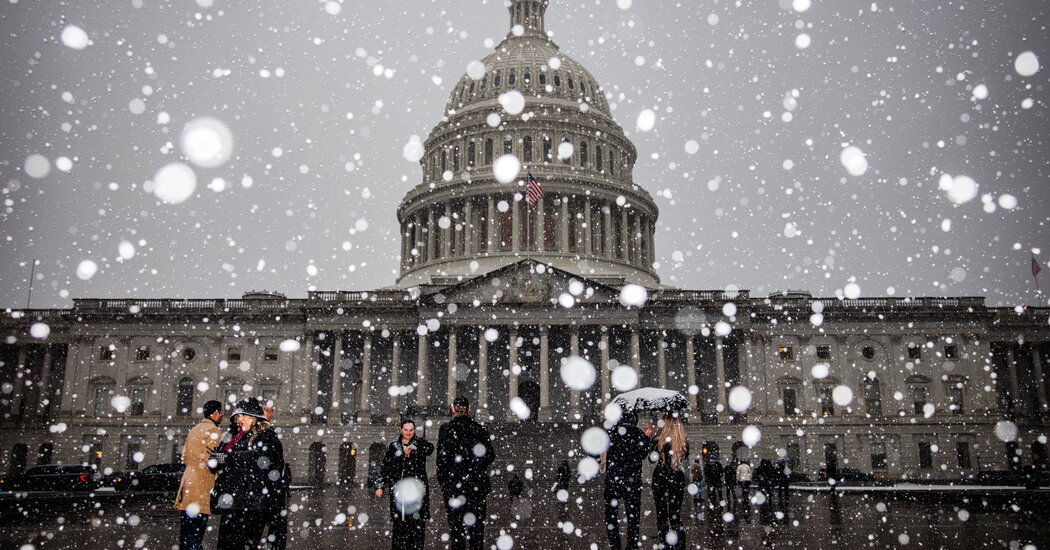Republicans in Congress have spent the opening weeks of President Trump’s second term falling in line behind his most scandal-tainted cabinet nominees, cheering him on as he tramples their power as a coequal branch of government and generally catering to his whims — and Americans seem to be loving it.
About 29 percent of voters approve of Congress, according to a Gallup survey released on Wednesday, a jump of 12 percentage points since last month and the highest approval rating that a long-despised institution has scored in four years.
But what is really behind this sudden positivity for the typically reviled legislative branch? A 42-point surge in approval among Republican voters.
It is the latest chapter in a long-running cycle of boom and (mostly) bust when it comes to Americans’ sentiments about Congress. Approval of Congress has jumped in the past when one party controls the White House and both chambers, according to public opinion experts, but the love affair rarely lasts. In 2021, Democrats held Congress in higher esteem for a moment, when their party controlled everything. In 2017, Republicans controlled all branches of government and briefly liked what they saw.
In this case, Republican voters are giddy about the prospect of a governing trifecta delivering on its promises. But they are likely to lose faith in Congress all over again in the coming months, just as they have in the past.
Jeff Jones, a senior editor at Gallup, said that when one party was in full control, “their side gets really excited about Congress.”
The high approval rating indicates “anticipation about possibilities,” Mr. Jones said. “But more often than not, they don’t meet those expectations. It may not last much longer.”
Still, even accounting for cyclical trends, the enthusiasm among Republicans is notable. A total of 53 percent of Republican voters said they approved of Congress, higher than any time since August 2005. Only 5 percent of Democratic voters said they approved.
“What we’re seeing is largely partisan excitement about the idea of entering unified party control,” said Molly E. Reynolds, a senior fellow in governance studies at the Brookings Institution.
There was also a 30-point jump in Republican approval of Congress from the last Gallup survey of the Obama administration in January 2017 to the first poll of the Trump administration that year. This year’s increase was bigger, Ms. Reynolds said, but “the trend of partisans being excited about the possibility of legislating under unified party control is there.”
Still, it is a bright moment, however brief, for an institution that everyone loves to hate.
Democratic and Republican voters alike generally hold a dimmer view of the faceless institution of Congress than they do of their representatives who serve there — and that is saying something. Year after year, in poll after poll, voters report that they do not think lawmakers on Capitol Hill care about the people they represent, nor do they think they do a good job of promoting laws and policies that serve the public interest.
Members of both parties report that their elected officials do a bad job of listening to constituents and a worse job of keeping their financial interests separate from their work on Capitol Hill. As for working across the aisle, well, 80 percent of Democrats and Republicans said lawmakers were not good at it, according to a Pew Research survey from 2023.
And Congress as an institution typically earns a lower approval rating than the lawmakers whom voters say they do not particularly trust. After all, it is a body made up of hundreds of these dubiously viewed characters.
“Congressional leaders are less charismatic and not as well known,” Mr. Jones said, explaining why the body consistently ranks lower than even the least popular presidents. “And the way Congress works can often get messy, and you have to get a lot of people to agree on something to accomplish anything. So a lot of these ratings are influenced by how the government matches your party preferences.”
The uptick in Republican approval coincides with a moment when the party’s leaders are ceding much of their power to Mr. Trump. Speaker Mike Johnson has positioned himself as a junior partner to the president rather than a leader of a coequal branch of government. Republicans in both the House and the Senate have shrugged as Mr. Trump has trampled on Congress’s authority and constitutional status as a check on his power.
Mr. Jones said the Gallup poll was unlikely to have factored in the daily specifics of what Congress is doing.
For instance, Republicans are wading into a complex and divisive budget debate that has divided the party and is forcing them to make tough choices, some of which are sure to disappoint voters.
But for now, they seem to have the generally correct impression of what is transpiring beneath the dome.
“I don’t know how much people really know about what Congress is doing on a day-to-day basis,” Mr. Jones said, “other than confirming Trump’s nominees.”
Polls and Public Opinion,Gallup Organization,House of Representatives,Senate,Republican Party,United States Politics and Government
#Poll #Shows #Americans #Approval #Congress #Soared #Long
